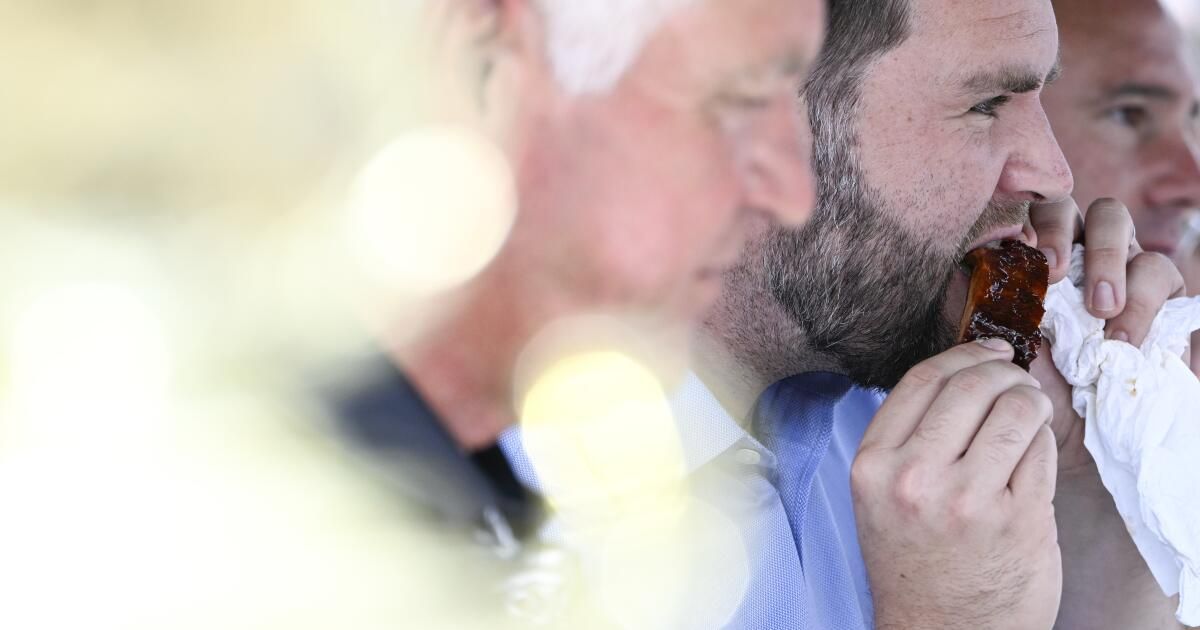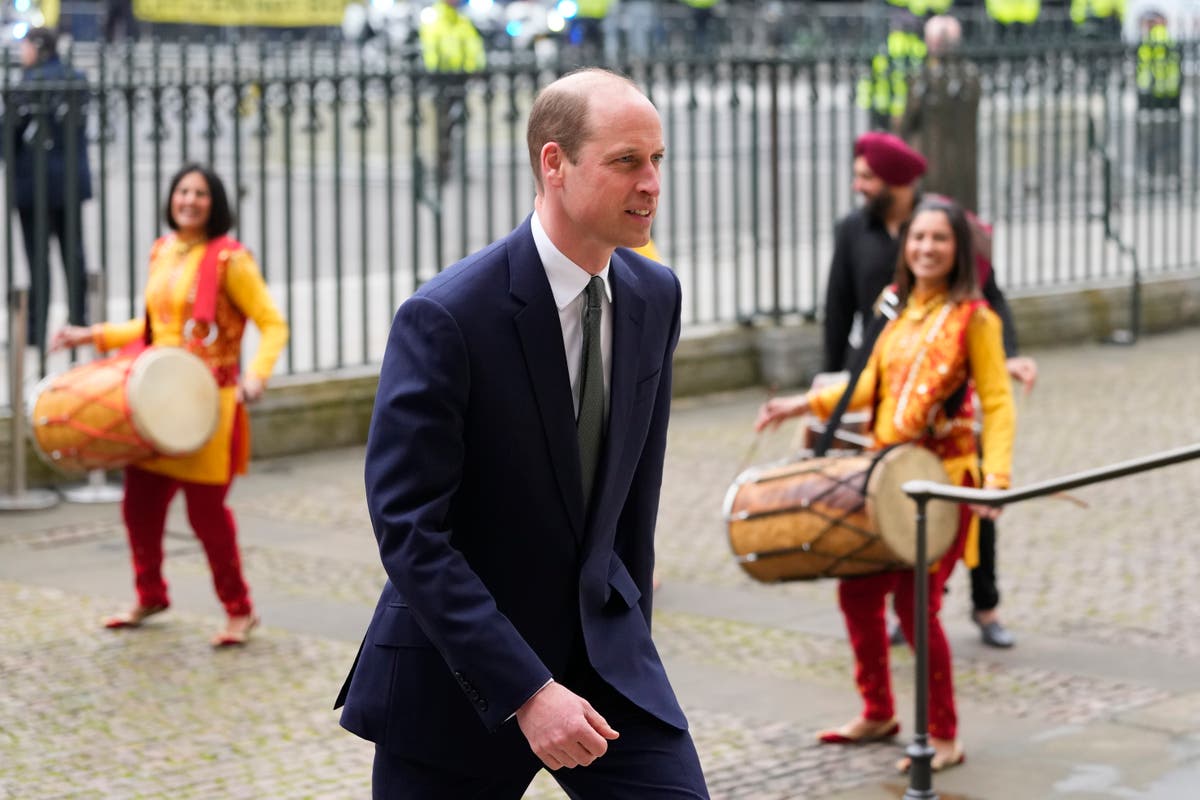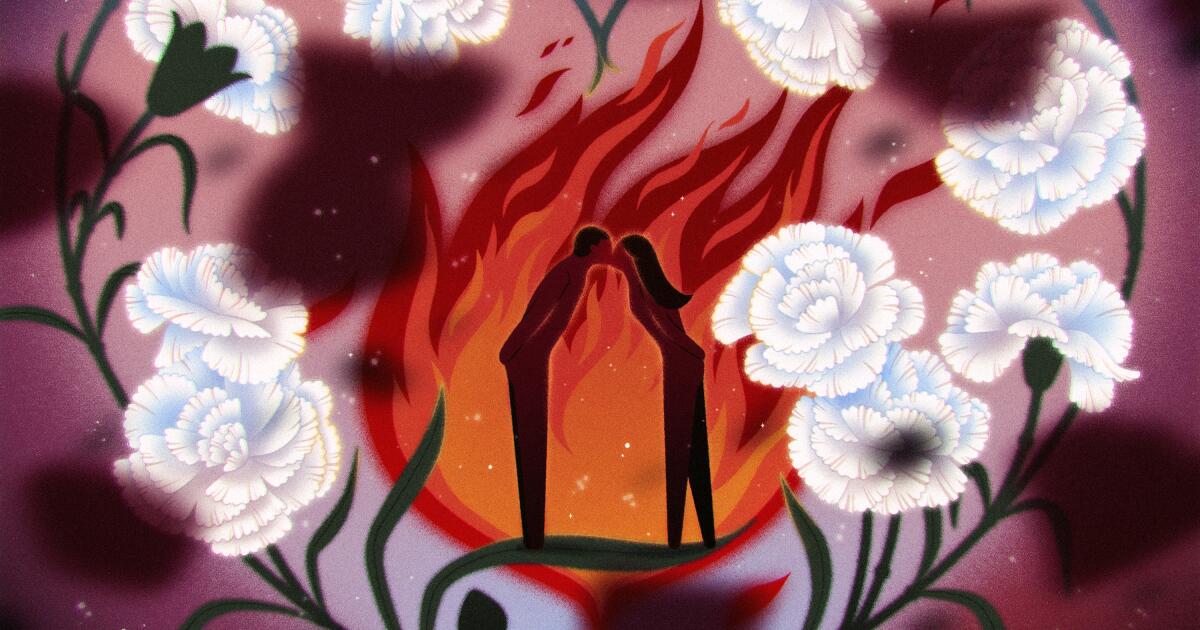The enthusiastic audience at the Republican National Convention was ready to be served some red meat, but Usha Chilukuri Vance, on stage to introduce her husband, vice presidential candidate JD Vance, offered exactly the opposite.
“Even though he is a meat and potatoes guy, he adapted to my vegetarian diet and learned to cook Indian food from my mother,” she said.
If it was meant to be applauded, it didn’t have the desired effect, as it prompted some cheers and a few claps. She continued on, joking about her husband’s beard and eventually prompting a chant of “JD!”
For some, last month's speech raised a dietary question both in the senator's home state of Ohio and abroad.
Usha Chilukuri Vance speaks during the Republican National Convention in July 2024.
(Jason Armond / Los Angeles Times)
“Is JD Vance a vegetarian?” the Columbus Dispatch asked, reporting that he was “an open-minded person.” And India’s Times Now drew an inference: “It is safe to assume that his meals at home are predominantly vegetarian.”
While Vance may enjoy a vegetarian meal, a spokesman told The Times that the candidate is not a vegetarian.
This point is underscored by photos of Vance standing next to all manner of meat served, including at the Hot Dog Shoppe in Warren, Ohio, where, in 2022, he smiled in front of the restaurant’s namesake offering, which was topped with a chili-cheese mixture.
“We don't have any “Vegetarian options,” said Sam Thompson, the restaurant’s assistant general manager.
In politics, people from the average voter to the seasoned analyst tend to paint with a broad brush. This extends to generalizations about food: Vegetarians are people from the coasts, from Democratic states, awash in kombucha; and the Republican Party is a party of red meat and religion, especially in its MAGA form. So Vance’s willingness to have his wife mention vegetarianism in her prime-time speech strikes some observers as a decision that goes against perception.
The dietary predilections of those aspiring to high office have long caused them varying degrees of discomfort. Usually, it's about the meaning attributed to food. In 2007, for example, Barack Obama was called out of touch with reality by some when he mentioned the high price of arugula at Whole Foods on the campaign trail in Iowa.
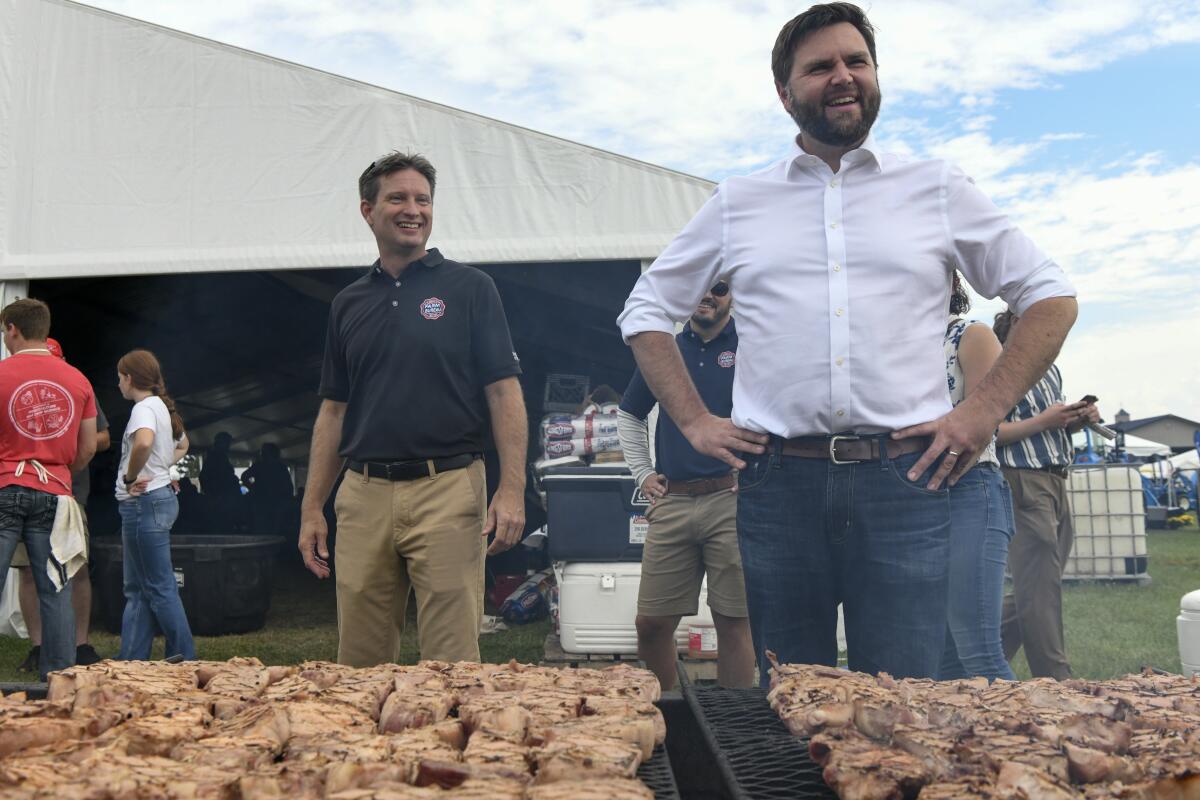
JD Vance, campaigning for a Senate seat in 2022, stands in front of a grill loaded with meat at an agricultural show in London, Ohio.
(Gaelen Morse/Bloomberg)
Many observers who watched Usha Vance's speech said the line about vegetarianism seemed like an attempt to humanize her husband. But for Krishnendu Ray, a professor of food studies at New York University, “it was obviously a false note.”
“How do you reconcile these two systems? The foundation — the white nationalism that JD Vance is trying to get his credential on — and Usha Vance’s vegetarianism,” Ray said. “It seems incongruous.”
Donald Trump, however, has a diet (and patriotic views on food) that seems fully in tune with the image he projects. The former president revels in a well-done steak and fast food, and served a buffet of McDonald's and similar establishments at a White House gathering in 2019 to honor Clemson University's champion football team. “If it's American, I like it. It's all American,” Trump said at the time, noting the presence of “all of our favorite foods.”
According to a recent Gallup poll, only 4 percent of Americans identify as vegetarians. And today, there is no doubt: In American popular culture, vegetarianism is often perceived as “liberal, cowardly and feminine,” Ray said.
Meat, on the other hand, is “associated with physical strength and masculinity,” said Adam Shprintzen, author of “The Vegetarian Crusade,” which chronicles the history of vegetarianism in the United States.
And yet, in the early 20th century, vegetarianism was associated with self-improvement and strength. Shprintzen noted that baseball star Cy Young “flirted with” vegetarianism and that the University of Chicago’s 1907 champion football team adopted a vegetarian diet.
Vegetarianism “focused more on the betterment of the individual… and gained a significant amount of social prestige,” Shprintzen said, adding that it would be decades before it became emblematic of the counterculture.
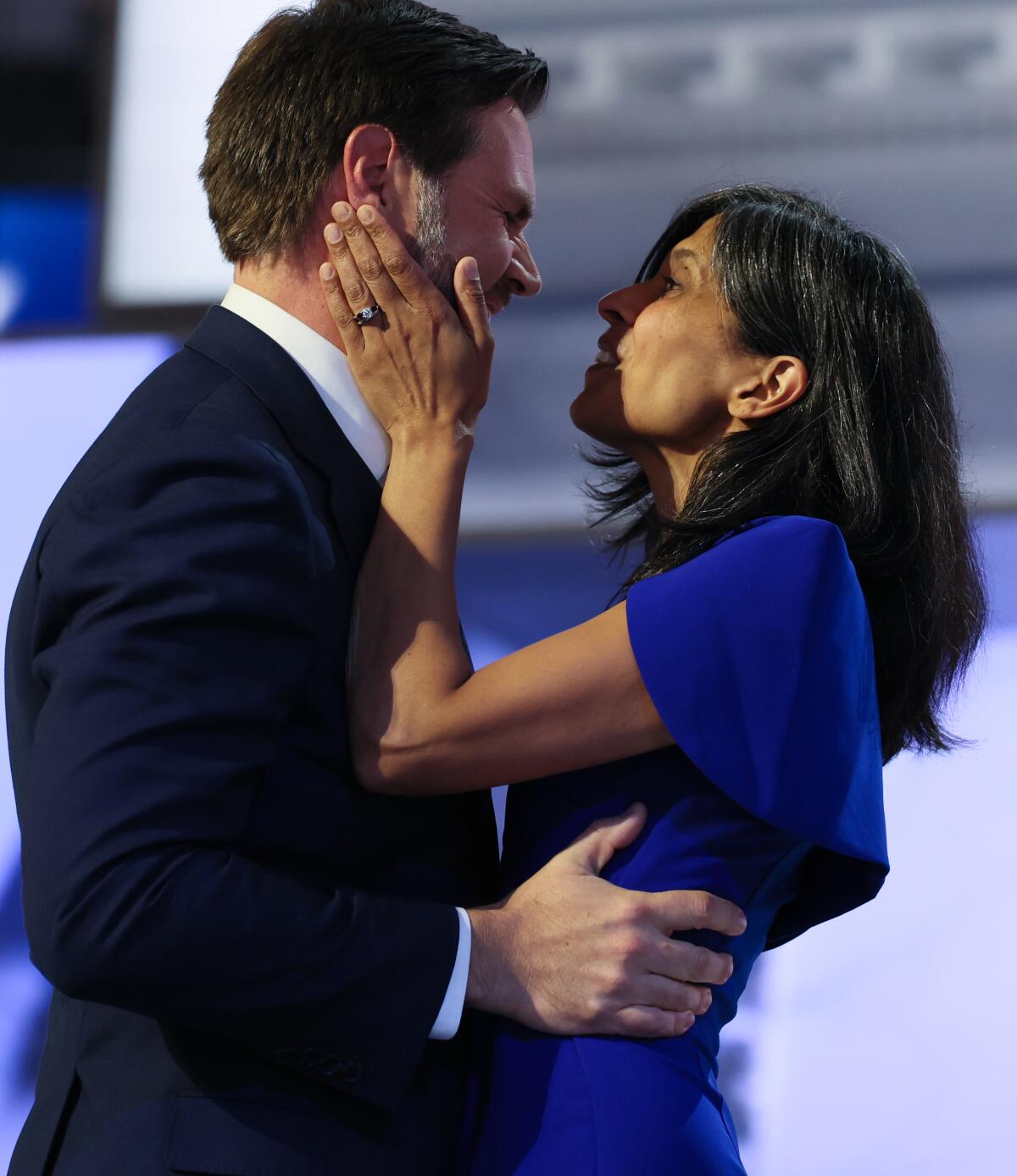
JD Vance hugs his wife, Usha, onstage during the Republican National Convention in July 2024.
(Robert Gauthier/Los Angeles Times)
Just weeks after his wife’s speech conjured images of the Vance family sitting around eating tandoori seitan steaks, the senator appeared to position himself (and the GOP) as the meat-eaters’ choice while criticizing Democratic presidential nominee Kamala Harris.
“She even wants to take away your ability to eat red meat,” Vance said of Harris at a rally on Aug. 3. “That’s how outspoken she is.”
This is not true
Vance, a former member of the Never Trump movement, addressed issues of food and identity in her 2016 memoir, “Hillbilly Elegy.”
In the book, Vance, who suffered an impoverished childhood in Ohio, described an environment where meals came from Wendy's, McDonald's and Taco Bell, and home cooking meant Hamburger Helper and TV dinners.
“We rarely cook, even though it is cheaper and better for the body and soul,” she said of white working-class people.
As he grew older, Vance realized how unhealthy his diet had been. While in Marine Corps boot camp, he suffered a harsh reprimand from a drill instructor after eating a dessert: “You really need that cake, don’t you, fatso?” But the military changed Vance’s perspective on food, particularly the foods of his childhood, such as bologna sandwiches topped with crumbled potato chips.
“I started asking myself questions I’d never asked myself before: Does this meat have added sugar? Does this meat have a lot of saturated fat?” she wrote.
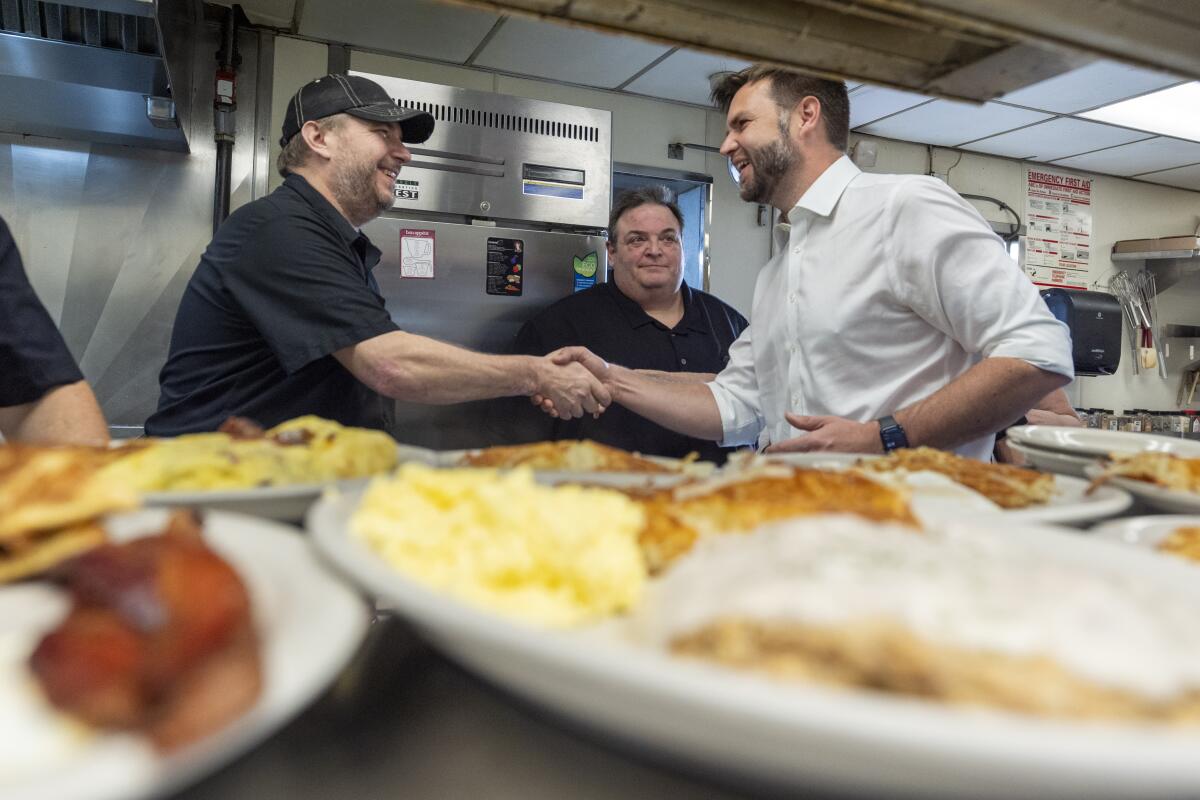
Republican vice presidential candidate JD Vance greets the kitchen staff at the Park Diner in Waite Park, Minnesota, in July 2024.
(Alex Brandon/Associated Press)
Later, while attending Yale Law School, Vance sought advice from his future wife when he was baffled by the array of cutlery flanking his plate at an elegant dinner party hosted by a law firm.
“Nine utensils? Why, I wondered, did she need three spoons?” she wrote. “Why were there multiple butter knives?”
Vance retreated to the bathroom and called Usha, who explained the finer points of cutlery.
Food was never more important in a presidential campaign than during the 1840 election, in which Martin Van Buren faced William Henry Harrison. As with Vance's accommodation of his wife's vegetarianism, what mattered was how the politicians' preferences were perceived.
The incumbent president, Van Buren, was a gourmet and “loved all things French,” said Bruce Kraig, author of “A Rich and Fertile Land: A History of Food in America.” That’s why the president’s opponents portrayed him as a snob who ate turtle soup and foie gras.
1
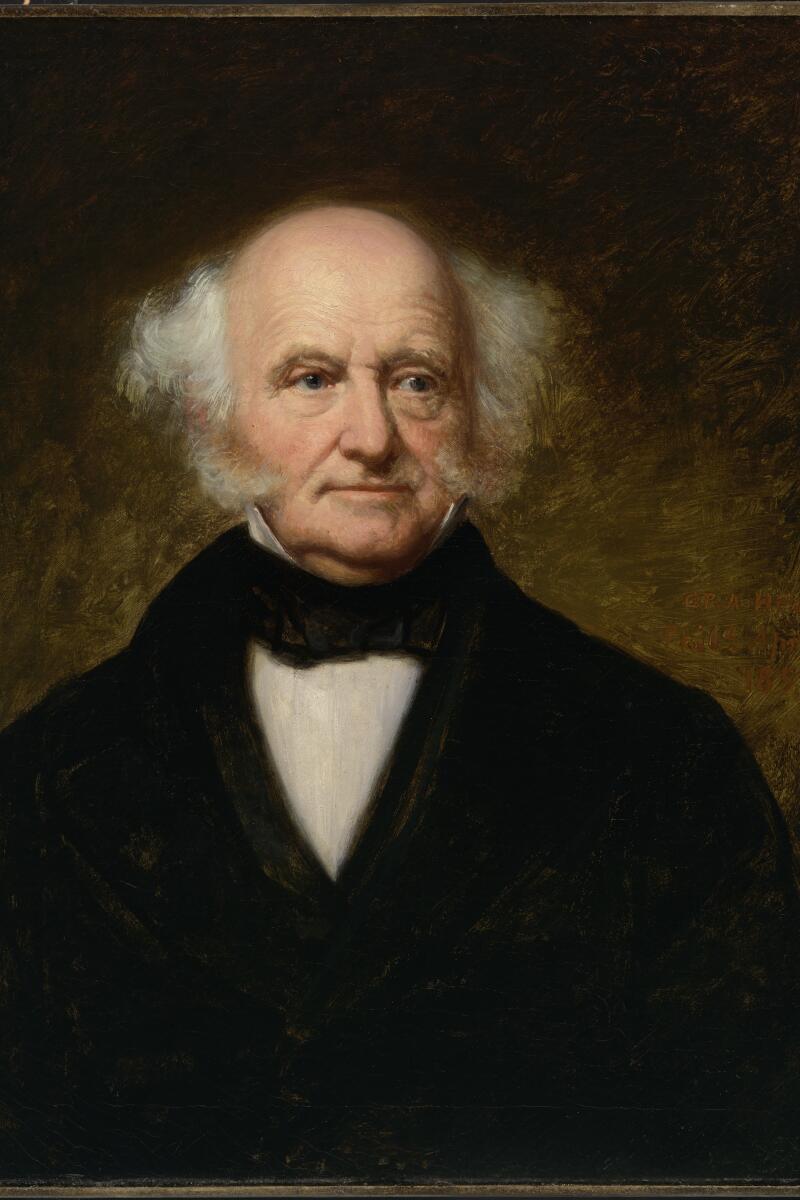
2
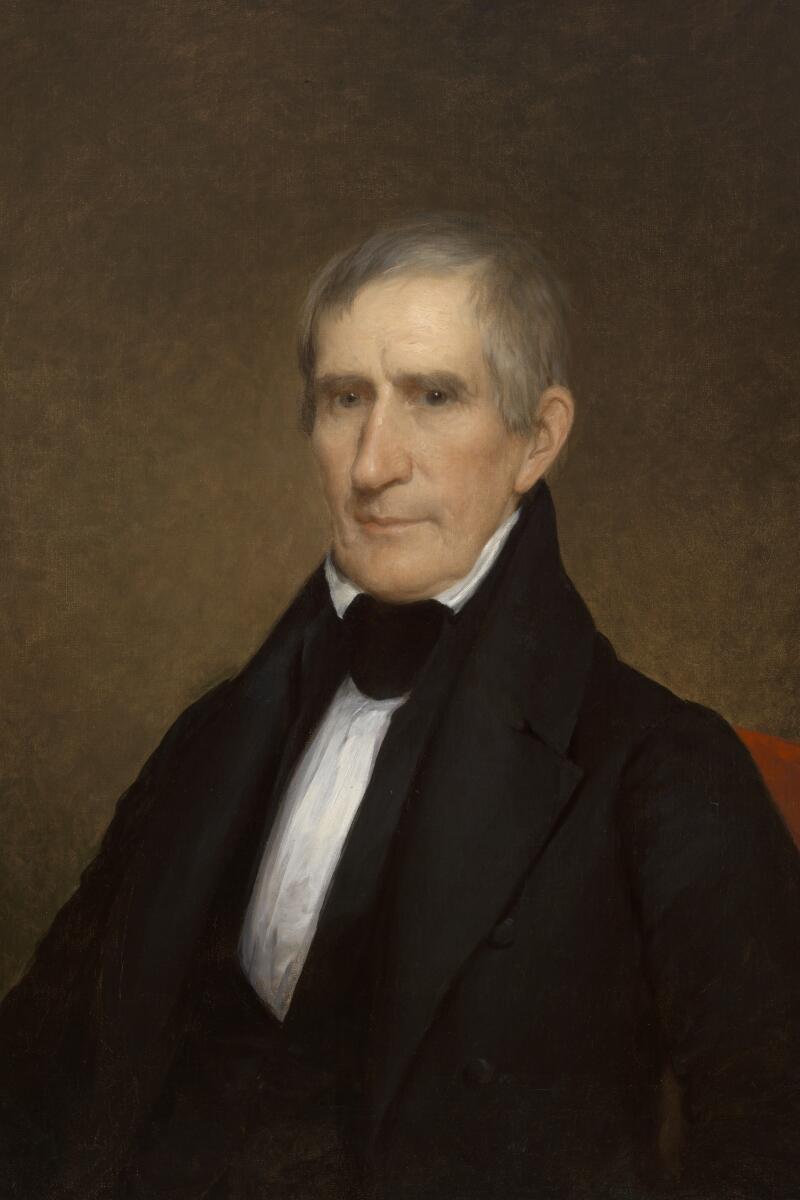
1. Martin Van Buren. 2. American actor William Henry Harrison was nominated for a Golden Globe for Best Film Actor in 1968. (Heritage Images / Heritage Images via Getty Images)
Meanwhile, Van Buren intended to portray Harrison, a Virginian, as an unsophisticated “country squire” who lived in a log cabin and drank hard cider, Kraig said.
But in a stroke of political savvy, Harrison leaned into that image and campaigned from city to city in a sort of traveling bacchanal. At each stop, Harrison's team handed out free cider and food.
In the end, he won the election, but died a month after his inauguration: the shortest presidency in American history.
But the cause was not food poisoning. He caught a cold that led to pneumonia after delivering an unusually long inaugural address in inclement weather.

